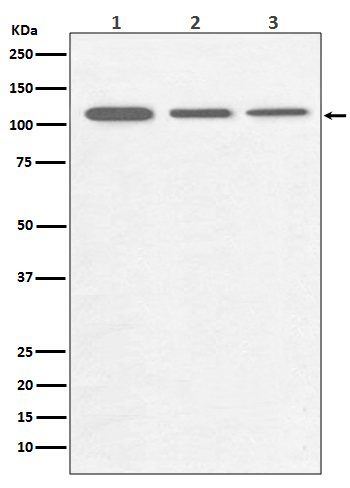PGC1 alpha/beta Rabbit mAb [z2lR]Cat NO.: A52699
Western blot(SDS PAGE) analysis of extracts from (1) HeLa cell lysate; (2) NIH 3T3 cell lysate; (3) C6 cell lysate.Using PGC1 alpha/beta Rabbit mAb [z2lR]at dilution of 1:1000 incubated at 4℃ over night.
Product information
Protein names :PPARGC1A; LEM6; PGC1; PGC1A; PGC-1v; PPARGC1; PGC-1(alpha);
UniProtID :Q9UBK2/Q86YN6
MASS(da) :91,027
MW(kDa) :113kDa
Form :Liquid
Purification :Affinity-chromatography
Host :Rabbit
Isotype : IgG
sensitivity :Endogenous
Reactivity :Human,Mouse,Rat
- ApplicationDilution
- 免疫印迹(WB)1:1000-2000
- The optimal dilutions should be determined by the end user
Specificity :Antibody is produced by immunizing animals with A synthesized peptide derived from human PGC1 alpha/beta
Storage :Antibody store in 10 mM PBS, 0.5mg/ml BSA, 50% glycerol. Shipped at 4°C. Store at-20°C or -80°C. Products are valid for one natural year of receipt.Avoid repeated freeze / thaw cycles.
WB Positive detected :(1) HeLa cell lysate; (2) NIH 3T3 cell lysate; (3) C6 cell lysate.
Function : Transcriptional coactivator for steroid receptors and nuclear receptors (PubMed:10713165, PubMed:20005308, PubMed:21376232). Greatly increases the transcriptional activity of PPARG and thyroid hormone receptor on the uncoupling protein promoter (PubMed:10713165, PubMed:20005308, PubMed:21376232). Can regulate key mitochondrial genes that contribute to the program of adaptive thermogenesis (PubMed:10713165, PubMed:20005308, PubMed:21376232). Plays an essential role in metabolic reprogramming in response to dietary availability through coordination of the expression of a wide array of genes involved in glucose and fatty acid metabolism (PubMed:10713165, PubMed:20005308, PubMed:21376232). Acts as a key regulator of gluconeogenesis: stimulates hepatic gluconeogenesis by increasing the expression of gluconeogenic enzymes, and acting together with FOXO1 to promote the fasting gluconeogenic program (PubMed:16753578, PubMed:23142079). Induces the expression of PERM1 in the skeletal muscle in an ESRRA-dependent manner (PubMed:23836911). Also involved in the integration of the circadian rhythms and energy metabolism (By similarity). Required for oscillatory expression of clock genes, such as ARNTL/BMAL1 and NR1D1, through the coactivation of RORA and RORC, and metabolic genes, such as PDK4 and PEPCK (By similarity)..
Tissue specificity :Heart, skeletal muscle, liver and kidney. Expressed at lower levels in brain and pancreas and at very low levels in the intestine and white adipose tissue. In skeletal muscle, levels were lower in obese than in lean subjects and fasting induced a 2-fold increase in levels in the skeletal muscle in obese subjects..
Subcellular locationi :[Isoform 1]: Nucleus. Nucleus, PML body.,[Isoform B4]: Nucleus.,[Isoform B4-8a]: Cytoplasm. Nucleus.,[Isoform B5]: Nucleus. Nucleus, PML body.,[Isoform 9]: Nucleus.
IMPORTANT: For western blots, incubate membrane with diluted primary antibody in 1% w/v BSA, 1X TBST at 4°C overnight.


